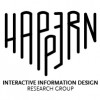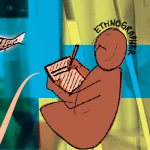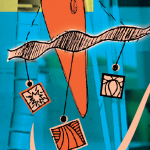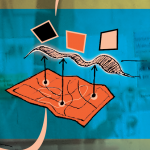More than anybody else, individuals with autism easily suffer from environmental stimuli and sensory overloads due to their particular sensory perceptual systems which also cause attention related problems as well as communication difficulties in everyday lives. It is a challenging task to satisfy such particular differences through existing methods that examines autistic sensory perception. Even though they provide extensive knowledge, they are insufficient to provide in-depth user specific live data for a learning and aware system. Thus, as we carry on ideating attentive user interfaces for autistics, this study focuses on possible research methods which can access sensory perceptual data in individual levels by combining biosensors and sensory ethnography.
Sensory Bio-Ethnography
Revealing Autistic Sensory Perception
Keywords: Autism, Sensory Ethnography, Biosensors
Team: Doğa Çorlu, Asım Evren Yantaç
Contributors: Verda Seneor
Publishing: (forthcoming) Preliminary Studies on Exploring Autistic Sensory Perception with Sensory Ethnography and Biosensors, HCII 2016
SUMMER RESEARCH PROGRAM
1. Research
During the first week of the program, in order to get to know each other, you will be expected to make a brief introductory presentation including your background and the studies you’ve done so far. We will present our studies and our work environment as well.
Literature Review
In order to understand what we are working on, you will be losing yourself in autism and ethnography literature including books and articles. You will also learn some basic knowledge about sensors and data collection regarding to the project. You will receive these reading materials before you start the program. Individual research on these topics beforehand is also welcome!
Archiving
You will be expected to expand our autism archive which we have already collected on various platforms. We will provide you a list of sources where you can find autism related content. You will individually choose different sources from this list and start archiving everything you find related to autism and published in 2015-2016.
#autisticmoments
We have an Instagram hashtag called #autisticmoments. You will be expected to take photos representing autistic sensory perception and upload them under this hashtag.
time: Week 1 & Week 2
keywords: autism, sensory perception, ethnography
2. Ideation
Sensors & Trials
You will make a table of sensors which collect bodily data. This table will be expected to cover how and what kinds of data such sensors collect. Afterwards, you will discover how to use Emotiv and GSR devices and conduct brief trials with the people around you.
Powerful Questions
Along with the literature review, you will be working on how to ask powerful questions in in-depth interviews which you may conduct with real users during the research program. You will prepare your own set of questions for different ethnographic studies where you will also use some devices such as Emotiv and GSR. These studies’ results will be expected to inform the ongoing project’s design process.
time: Week 2 & Week 3
keywords: sensory ethnography; semi-structured interview; biosensors; user studies; prototyping
3. User Studies (US)
Organize and Conduct User Studies
There will be several ethnographic studies which you’ll conduct throughout the program. You will be individually assigned to at least one of them and after that point, you’ll start organizing your study. You’ll recruit participants, you’ll organize how and where to conduct it. We will provide you a contact list where you can find participant informations to get into contact with them for your studies (expanding the list will be appreciated). These ethnographic USs are as follows: US 1) Mirror experience during daily life US 2) Open office experience US 3) Refined Reality Mirror prototype experience and US 4) One day in the city with an autistic friend. You can find the details of US 1 – 2 – 3 on Refined Reality Mirror page, under the Summer Research Program section. After organizing these studies, it will be the time to conduct them by combining the knowledge you already have and the experiences you gained by the previous tasks. We will be conducting some of them all together or helping you for any issues you may encounter during the studies.
time: Week 3 & Week 4
US 4: One Day in the City with an Autistic Friend
You will write a detailed report of the studies you conducted. You also present these studies to all of us during the last week of the program.
time: Week 3 – 7
Report
You will write a detailed report of the studies you conducted. You also present these studies to all of us during the last week of the program.
time: Week 7
29 February 2016
We have just submitted our works on Biosensory Ethnography in HCII 2016 which will be held in Canada in July.



